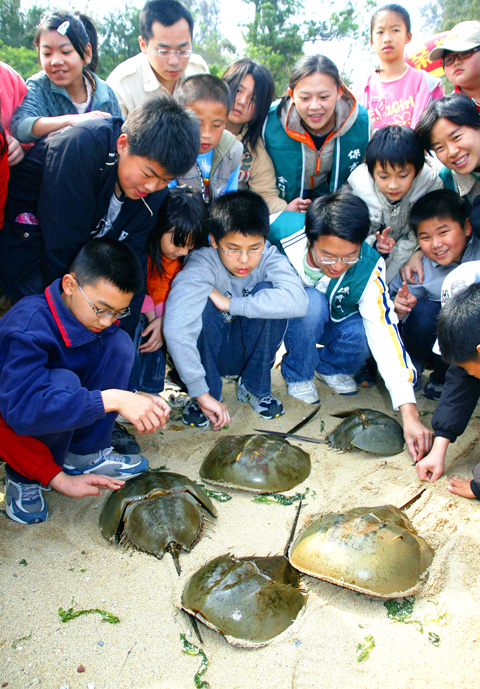¡@
Baby Asian
horseshoe crabs released into the wild
STAFF WRITER, WITH CNA
Saturday, Apr 26, 2008, Page 2
¡@
 |
| Schoolchildren
in Kinmen County inspect adult horseshoe crabs at an educational event
organized by the Kinmen Aquaculture Research Institute yesterday.
|
¡@
Some 350,000 baby Asian horseshoe crabs bred in captivity
were released into the ocean near Kinmen yesterday in an effort to conserve the
species.
Kinmen County Deputy Commissioner Yang Chung-chuan (·¨©¾¥þ) led more than 200
Kinmen residents and students in the activity, which was held on the shores of
Chienkung islet and the mouth of Wuchiang Creek.
The release was conducted under the supervision of officials from the Kinmen
Aquaculture Research Institute (KARI), which bred the crabs.
KARI researchers said the horseshoe crab is nearly extinct in waters surrounding
Taiwan proper but it is occasionally seen near the Penghu Island group and on
the west coast of Taiwan proper.
The seas around Kinmen are among the horseshoe crab¡¦s most important natural
habitats, but even there, its numbers have declined in recent years as a result
of industrial and urban development, the researchers said.
The sharp drop in the crab population prompted KARI to zone an 800-hectare
coastal area near Kuningtou as Kinmen¡¦s horseshoe crab conservation district in
1999 in the hope that its population could be preserved.
Since 2006 KARI has staged annual releases of baby horseshoe crabs to help
accelerate the natural replenishment of the species, known as a ¡§living fossil¡¨
because it has changed little in its 400 million years of existence.
Some 70,000 baby crabs were released last year.
With a distinctive domed carapace shaped like a horseshoe and a stiff pointed
tail, the Asian horseshoe crab, or tachypleus tridentatus, is known as one of
Taiwan¡¦s few ¡§living fossil¡¨ species.
¡@
¡@
China
offers a bone
Saturday, Apr 26, 2008, Page 8
Pre-Olympics pressure on the Chinese government is beginning to pay off, with
reports that Beijing is willing to meet representatives of the Dalai Lama.
It may be churlish to say, but it is also true: The Chinese are not floating
talks because they feel regret over recent events in Tibet, nor because they are
willing to entertain the suggestions of the Tibetan government-in-exile.
They are doing so because it throws a bone to other governments growing restless
at Beijing¡¦s intransigence and boorishness. An Olympics tournament stained by
Chinese misanthropy at home and abroad is inevitable, so, for the Chinese, it¡¦s
now all about damage control.
Another example of the symbolic damage that China cannot help inflicting on
itself came on Thursday with the latest torch debacle in Canberra.
The thing that made this leg of the relay different was the effort put into
mobilizing thousands of sometimes hostile Chinese and Chinese-Australian
protesters, whose tactics included verbal and physical assaults on a small
number of pro-Tibet protesters. Vivid scenes of violence and jingoism
demonstrated that this Olympic Games is headed irrevocably toward symbolic
disaster.
Links between the Chinese embassy and the protesters have been alleged by the
head of the local government that includes Canberra. This is hardly surprising,
because Chinese embassy and consular officials are well known to have informal
but proficient systems of surveillance throughout Australia¡¦s Chinese community
and civic organizations.
The message to people outside Australia is that the majority of people with
Chinese heritage would not support the Chinese ambassador¡¦s defiance toward law
enforcement officials over the role of the paramilitary torch guardians, for
example, nor the disrespectful behavior of the Chinese protesters.
The message to the Chinese protesters in Canberra, however, should be far less
civil. It was not so long ago that Australia gave thousands of Chinese students
sanctuary when their government massacred their fellows in the nation¡¦s capital.
Now, a generation later, today¡¦s youth from the Central Kingdom ¡X in this case,
largely members of the elite ¡X are acting as tools of that same government and
(literally, in some cases) spitting in the face of democratic freedoms of their
host country.
That so many Chinese and Chinese Australians abused their freedom to protest by
turning the occasion into a celebration of intimidation and nationalist bile
offers another wake-up call to those romantics who say that engaging China is in
itself sufficient to produce a more civilized and open country.
It is one thing to attend a torch relay carrying a flag. It is another thing
altogether to receive embassy support and money and carry placards praising the
domination of Tibet at an event celebrating world peace.
Unfortunately for China, the damage is long done. All that remains is for
Beijing to alienate even its sympathizers in the West as the Games approach.
Meeting with the representatives of the Dalai Lama is simply not enough, and
although the prospect of more talks and genuine communication is tantalizing,
the reality is that nothing will come of it unless other governments maintain
their pressure and teach China, this empire of self-pity, the meaning of
accountability.
¡@